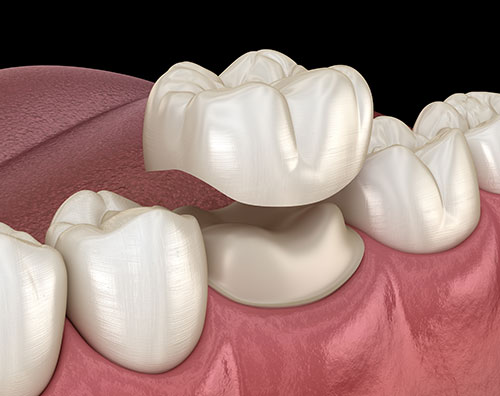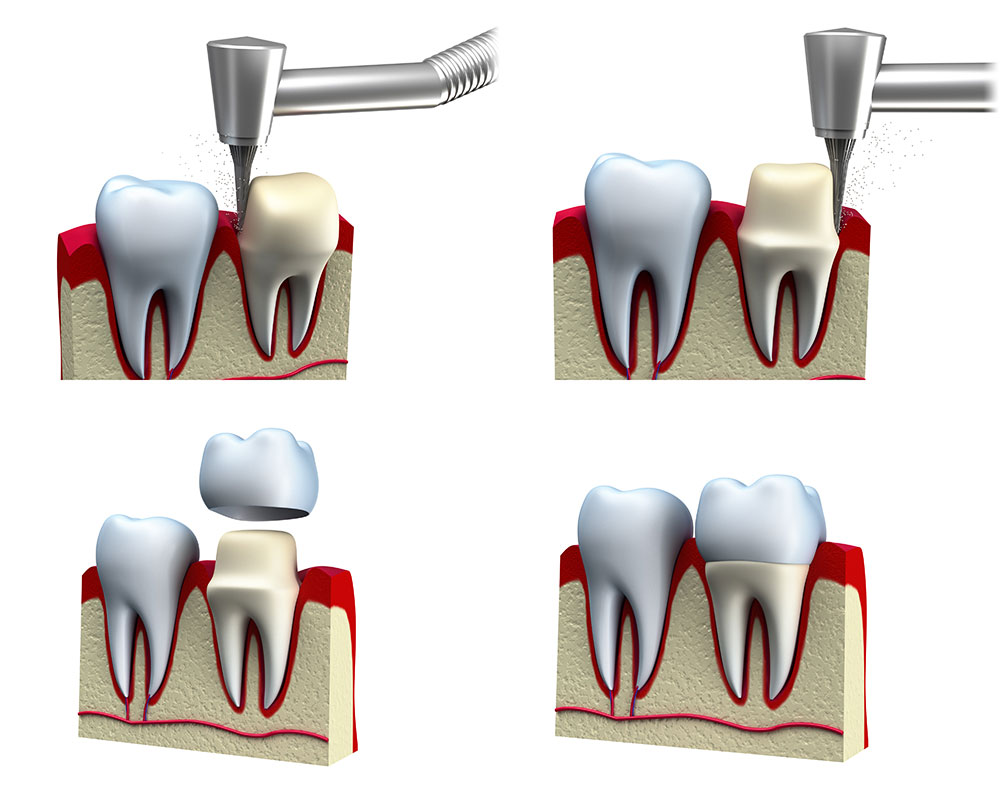Dental Crowns
It might seem trivial, but your smile carries a lot of weight. It’s how you greet the world, how you connect, how you express yourself. But when a tooth is damaged—cracked, worn down, or compromised by decay—both form and function can take a serious hit. That’s where dental crowns come in.
A dental crown is essentially a cap that’s custom-designed to cover and protect a weakened tooth. It’s not just about cosmetics—though yes, the aesthetic benefits are huge. It’s about tooth restoration that allows you to chew, speak, and smile with comfort and confidence. Whether you’re dealing with a broken molar or prepping for a dental bridge, crowns are a versatile and reliable solution that play a key role in modern dentistry.
Common Uses for Dental Crowns
Dental crowns aren’t a one-size-fits-all fix, but they do handle a wide range of dental challenges. Here are some of the most common situations where a crown might be the best option:
- Tooth Decay: When a cavity is too large for a filling to safely restore the tooth, a crown steps in to protect what remains.
- Broken or Fractured Teeth: Crowns act like armor for damaged teeth, restoring strength and stability while preventing further harm.
- Large Fillings: Sometimes, a tooth has more filling than actual structure left. A crown reinforces the tooth, helping it hold up under pressure.
- Post-Root Canal: After a root canal, teeth can become brittle. A crown locks everything in place, protecting the tooth long-term.
- Cosmetic Dental Solutions: Crowns can dramatically improve the look of teeth that are discolored, oddly shaped, or otherwise imperfect.
- Dental Bridge Support: Crowns are used to anchor a dental bridge by securing it to the surrounding teeth.
Each of these scenarios involves a mix of function and aesthetics, and a crown addresses both—restoring health while elevating your smile.

Materials Used for Dental Crowns
One of the great things about crowns is the range of materials available. Each has its own strengths, so your dentist will help you choose the right one based on where the crown is going and what your goals are.
- Porcelain or Ceramic Crowns: These are the top choice for front teeth because they look the most like natural enamel. If appearance is your priority, this is usually the way to go.
- Metal Crowns (Gold or Silver Alloys): Metal is tough. These crowns are built for durability, making them perfect for molars that do the heavy lifting when you chew.
- Porcelain-Fused-to-Metal (PFM): Think of this as a hybrid option. You get the durability of metal plus the natural appearance of porcelain.
- All-Resin Crowns: More budget-friendly and usually used temporarily. They’re a bit less durable, but they get the job done while you wait for a permanent solution.
- Zirconia Dental Crowns: Strong, sleek, and biocompatible. Zirconia blends durability with aesthetics and is a popular choice for patients who want a long-term, natural-looking result.
Choosing the right crown material isn’t just about looks—it’s about longevity, comfort, and how your bite functions every day.
Best Dentists in Washington & Oregon
The Dental Crown Procedure
Getting a crown sounds more intense than it really is. Here’s what the process looks like:
Initial Examination and Consultation
Your dentist assesses the damage and determines if a crown is your best option. Sometimes, X-rays are taken to check the roots and surrounding bone.
Tooth Preparation
The tooth is shaped to make room for the crown. If there’s decay, it’s removed. If there’s not much tooth left, your dentist may build it up first.
Impression Making
A mold or digital scan of your mouth is taken. This is used to design your custom crown for a perfect fit.
Temporary Crown
While your permanent crown is being made (which can take a few days to a couple of weeks), you’ll wear a temporary one to protect the tooth.
Crown Fabrication and Fitting
Once ready, your crown is checked for fit, color, and comfort. Minor adjustments ensure everything feels just right.
Placement and Adjustments
The crown is cemented into place. You’ll bite down a few times to test the alignment and make sure your bite is comfortable.
Post-Procedure Care
Your dentist will share tips to keep your crown in top shape—and the good news is, most of them match regular dental hygiene habits.

Longevity and Care for Dental Crowns
Most crowns hold strong for 5 to 15 years, but good habits can push that number even higher. Several factors affect how long a crown lasts:
- Material: Metal crowns tend to last the longest, while resin crowns are more temporary.
- Oral Hygiene: Brushing and flossing daily can keep the surrounding gum tissue healthy, which helps your crown last longer.
- Bite Stress: If you grind your teeth or have a habit of chewing ice or hard candies, your crown’s lifespan may be shorter.
Maintaining Your Dental Crown
Protecting your crown means taking care of it like you would your natural teeth—with a few added precautions.
- Brush Twice a Day: Use fluoride toothpaste and a soft-bristle brush to keep your teeth and crown clean.
- Floss Daily: Floss around your crown gently to prevent plaque from building up at the gumline.
- Avoid Hard or Sticky Foods: Biting down on hard candies, ice, or very sticky foods can damage or dislodge your crown.
- Regular visits keep your smile on track: Skip them, and minor problems can quietly turn into major repairs.
- Use a Mouthguard if You Grind Your Teeth: This protects your crown (and the rest of your teeth) from nighttime grinding damage.
Caring for your crown isn’t complicated—it’s just a smart, daily habit that pays off.
Dental crowns do more than cover up damage—they restore confidence, protect your oral health, and help you keep living life without worrying about a fragile tooth. Whether you’re getting a porcelain crown for a front tooth or a zirconia crown for a back molar, the goal is the same: to bring back comfort, strength, and a natural look.
So if your dentist recommends a crown, think of it as an investment in your long-term health. With the right care and regular check-ups, your crown can last for years—quietly doing its job while you focus on everything else that matters.
